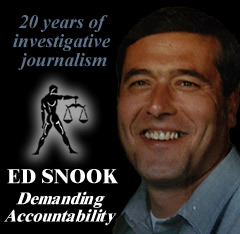LAWYER MIKE MARTIN MISREPRESENTED CANCER PATIENT
By Edward Snook Investigative Journalist
September 4, 2009
NewsWithViews.com
Houston,
Texas – On July 31, 2009, a Houston, Texas jury delivered a verdict
in favor of “Silicosis” victim Clark Kirkland, not against
the company who created the machine that was responsible for his life-ending
disease, but against his own 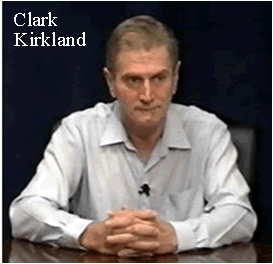 attorney
who had literally sold this war veteran “down the river.”
Veteran Army Specialist and South Carolina resident Clark Kirkland was
father to two children and married to his wife Sharon for twenty-five
years.
attorney
who had literally sold this war veteran “down the river.”
Veteran Army Specialist and South Carolina resident Clark Kirkland was
father to two children and married to his wife Sharon for twenty-five
years.
The attorney he complained about for years and ultimately sued wasn’t the average shingle-on-the-door attorney. This attorney was former Democratic State Representative Mike Martin, also former aid to powerful Texas State Senator Babe Swartz, also one of the 'Mighty 12' on the silicosis multidistrict litigation board (MDL), also owner of the nationally historic downtown Houston landmark building known as “The Clock Tower.”
Right or wrong, good or bad, the old expression not to fight city hall goes up a few notches if you aim to expose a rich, politically powerful attorney in his hometown. Who would be crazy enough to take this attorney on? No one wants to say it out loud but there is a reason for all the attorney jokes. There is usually nothing the average Joe can do against an attorney – let alone a Senate aid, a State Legislator and a political big wig. A wise man would take his lumps and move on. Clark in fact knocked on the door of many law offices before he found one who would sue another attorney – and then even more doors before he found one to sue the mighty Martin.
Clark’s Condensed History
The story of Clark Kirkland is the story of an American who answered his country’s call for help and like many good soldiers, got the heavy boot of irresponsible corporate decisions down on his hard working honest back, along with the red tape of political and administrative delays in his face.
Clark’s older brother volunteered to serve in Vietnam and did so honorably, so when Clark turned 17, with the blessings of his patriotic family, he too signed up with Uncle Sam for Vietnam. Instead of “fighting” for his country, the Army sent him to Georgia to drill into hard granite rocks with a machine made by Ingersoll-Rand Corporation nicknamed the "widowmaker.”
Since
the 1930’s Engineers knew that the hole where the dust rises needed
to be at least three feet away from the operator.  The
“widow maker” placed it two inches away. As the drill bites
into the granite, like a tornado, a white cloud of silica dust races
through the hole, shooting cannon blasts of silica into the face of
the operator. The cure to the diseases caused by the “widow maker”
is simple and cheap - Move the hole over out of the operator’s
face. Place a metal umbrella over the hole to catch the dust. Install
a dust suppression device. The dust suppression device is essentially
a tub of water with a hose to wet the silica dust, which keeps it from
blasting the drill operator. Ingersoll-Rand knew how to make these machines
safe. The problem was that if they built them dangerously, with the
hole in the operator’s face – it was good for business,
but not so good for the operator. Good for business, because they could
sell the umbrella and the water hose as an extra – and everyone
would buy it. Why make safety free? Why design it to make it safe and
not be able to sell safety as an add-on? Ingersoll-Rand simply made
more money selling a very dangerous piece of equipment, which forced
companies to buy the easily made safety add-ons. As a business model
it worked pretty well – except when it killed people.
The
“widow maker” placed it two inches away. As the drill bites
into the granite, like a tornado, a white cloud of silica dust races
through the hole, shooting cannon blasts of silica into the face of
the operator. The cure to the diseases caused by the “widow maker”
is simple and cheap - Move the hole over out of the operator’s
face. Place a metal umbrella over the hole to catch the dust. Install
a dust suppression device. The dust suppression device is essentially
a tub of water with a hose to wet the silica dust, which keeps it from
blasting the drill operator. Ingersoll-Rand knew how to make these machines
safe. The problem was that if they built them dangerously, with the
hole in the operator’s face – it was good for business,
but not so good for the operator. Good for business, because they could
sell the umbrella and the water hose as an extra – and everyone
would buy it. Why make safety free? Why design it to make it safe and
not be able to sell safety as an add-on? Ingersoll-Rand simply made
more money selling a very dangerous piece of equipment, which forced
companies to buy the easily made safety add-ons. As a business model
it worked pretty well – except when it killed people.
Silica
dust in the lungs can take 30 years to turn to silicosis and then
more time to, as the doctors say, “metastasize” into cancer
– so the operators often died not knowing why. Lots of profit,
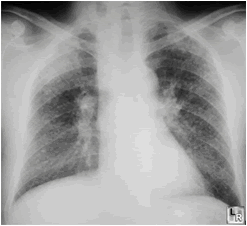 selling
the safety equipment with the bad hole – and very few lawsuits
when they don’t. This was particularly true with the Army which
didn’t buy the safety equipment. So, because Clark was ordered
to operate the “widow maker” from 1971 – 1974, because
Ingersoll-Rand made more money selling dangerous pneumatic drills than
safe ones, because the Army didn’t care – Clark breathed
the deadly silica dust into his pink tender lungs.
selling
the safety equipment with the bad hole – and very few lawsuits
when they don’t. This was particularly true with the Army which
didn’t buy the safety equipment. So, because Clark was ordered
to operate the “widow maker” from 1971 – 1974, because
Ingersoll-Rand made more money selling dangerous pneumatic drills than
safe ones, because the Army didn’t care – Clark breathed
the deadly silica dust into his pink tender lungs.
The silica dust, sucked into Clark’s lungs, on day-one started to make his nose bleed, to make him cough, and it began to scratch and scar his lungs. When Clark left the service with a life-time cough, he had no idea he was a dead-man walking.
Clark did contract work for the FBI, bounty hunter work for the courts, and truck driving jobs, because alone in the truck, no one complained his cough was too loud. When picking up criminals, no fugitive could complain that he didn’t want to be arrested by a coughing man. But Clark couldn’t keep an indoor job with co-workers who were annoyed or fearful of his cough, so his income suffered for thirty years. Clark Kirkland suffered, yet survived with his loving wife Sharon Kirkland, in a marriage that ultimately lasted 25 years, until his death from silicosis on May 29, 2009.
Discovering Silicosis and Trying to Get Help
In 2001, the silicosis got so bad Clark fell to his knees coughing violently and broke his ribs. The Army took tissue from his lungs, sent it to Board Certified Pathologist Dr. William Chapman, who found “what was probably silica” in his lungs. Subsequently, cardiothoracic surgeon and author of a medical book on lung diseases, Dr. John Lucke, diagnosed him in April 2001, with the dreaded disease silicosis, and told him his lung had to be taken out.
No
one wants to be told they are going to choke to death on their own vomit,
after their lung is taken out – if they are lucky. So 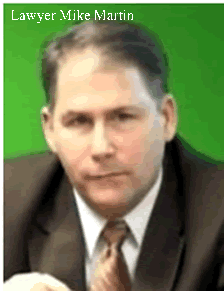 Clark
typed “silicosis doctor” on his computer, looking for a
second opinion and up came the law firm of Martin, Maloney and Mitchell.
After a half hour on the phone, Clark figured out it wasn’t a
doctor’s office. He’d been talking to an attorney who seemed
like a silicosis encyclopedia, which he was. Hundreds of trials Martin
claimed. Thousands of settlements he boasted. Cases all over the country.
He’d sue Ingersoll-Rand and get Clark millions for his family
and then…Ingersoll-Rand would quit selling the widowmaker without
safety devices.
Clark
typed “silicosis doctor” on his computer, looking for a
second opinion and up came the law firm of Martin, Maloney and Mitchell.
After a half hour on the phone, Clark figured out it wasn’t a
doctor’s office. He’d been talking to an attorney who seemed
like a silicosis encyclopedia, which he was. Hundreds of trials Martin
claimed. Thousands of settlements he boasted. Cases all over the country.
He’d sue Ingersoll-Rand and get Clark millions for his family
and then…Ingersoll-Rand would quit selling the widowmaker without
safety devices.
So, Clark signed a contract with attorney Mike Martin in October of 2002 and waited - and waited. Martin had told him the suit had to be filed by April 2003, two years after Dr. Lucke told him he had silicosis. The date Clark knew or should have known, is what attorney’s call the trigger date. All deadlines start then. It’s like a gunshot starting a race. You have to get your suit filed before the clock runs out. In Georgia the hour glass on these types of cases is two years.
Christmas went by and Clark was getting worried. January passed and Clark now called Melanie Tomerlin, Martin’s paralegal, worried about getting his suit filed on time. February passed and Clark got ill worrying about it, combined with his increased coughing. Martin had told him not to let Lucke take the lung out until the suit was filed and Clark’s testimony was recorded. When a doctor takes your lung out and does everything right you have a 12% chance of the fluid filling up your other lung and choking you to death. Without Clark’s testimony his family had no chance to win the case if he was dead. And then it happened - The suit was filed - At the last minute. A letter dated April 16, 2003, and received a few days later said; “The suit was filed April 11. Here is your copy.” And on the fourth month of 2003, Clark rested, not know that his suit had been dismissed on April 17, 2003. Then he started up again. When will you get my testimony recorded? And May passed. And June passed. And July. And August. And Fall came with no testimony recorded – and the silicosis cancer in Clark’s lung grew, and his coughing and vomiting increased. His 93 year old dad and his 88 year old mom and Clark’s son, Clark Jr., and his daughter, Cathy, and his wife, all got up on the roof and re-roofed the Kirkland home; but 50 year old Clark, with his health slipping away, couldn’t even stand up and give moral support.
Thanksgiving came and went with no return phone calls. In December of 2003, Kirkland repeatedly called his attorney’s new paralegal, Arlene Black as he was unable to get Martin to return calls. When this didn’t work, Clark called the court to ask about his suit and giving his testimony.
The court clerk told him he had no suit. You don’t give testimony without a case. The suit had been dismissed on the 17th of April – nearly eight months prior! The two-year deadline in Georgia was blown. It was all too obvious. Martin was controlling things, putting everything off – waiting for the silicosis cancer to spread and kill Clark – so when Clark died his testimony would die, his case would die, and Martin could bury the malpractice he had committed – and no one would do anything, because nothing could be done.
What martin had neglected to tell Clark in April of 2003, was that his case had been dismissed because Martin violated “rules of the road” (court rules) in Georgia. Martin did not have a Georgia law license, so he couldn’t file a suit there without permission of the court. To get permission he had to follow certain specific rules:
1 - Properly ask for it BEFORE filing the law suit as an attorney. This is done by filing a motion attorneys call “Pro Hac Vice,” which simply means “for this thing,” this case.
2 - Learn the local rules.
3 - Have a local Georgia attorney vouch for you. Martin did none of these things. The Muscogee County Judge called him and told him “You can’t do that,” it’s a crime in Georgia – and the case was dismissed.
4 - Explain every Georgia court experience you have had in the last three years.
In December of 2003, Clark picked up his old bounty hunter hat. He couldn’t dress up and slap on iron and go after Martin, but he could smoke him out. He called Martin’s office and told Arlene Black what he’d learned – and what he’d do about it. He’d file criminal charges, he’d file a complaint with the state bar and he’d take Martin down too – unless Martin called him back.
Arlene, a dedicated paralegal who cared about Clark and all her clients, but also cared about her boss, attorney Mike Martin, typed out a message to Martin: “I have spoken with Mr. Kirkland three different times and he called the court and found out his case was dismissed and he’s very upset. I do not know what to tell him.”
The bounty hunter had set out a trap. Clark didn’t know the ways of civil law or attorneys; but in criminal work with the FBI and as a bounty hunter, Clark knew how to corner a liar. When Martin finally called to stop Clark from filing charges, Clark pushed the record button and Martin danced the political Texas two-step, trying to hide what really happened. During that phone call in December of 2003, Martin admits he may have forgotten to tell Clark his suit had been dismissed since April. Clark is upset, but Martin tells him the analysis in 2001, doesn’t matter, only Dr. Lucke’s later letter of February 2002, mattered. “Because of that rejection,” he states, we’ll go with February 2002; but we would have eventually done that anyway.
Clark sees this as his attorney telling him to lie. He wants nothing to do with that and he fires him. Since Clark doesn’t know the deadline is three years in his home state, that the top lung firm in the country is in his home state of South Carolina and wants his case, and that he isn’t legally forced to keep the contract with Martin, he gives in. Martin stays on the case.
After the December, 2003, phone call things would never be the same. Clark would never trust Martin again. Martin would never really believe in the case again; but he would try to stall and wait Clark out.
In
the rejected suit in Muscogee, Georgia the lead defendant was listed
as Ingersoll-Rand. Soon Martin would change the lead defendant to 3M,
but Clark may have used 3M masks for only a couple of weeks –
masks of paper that would have no effect on the silica storm blasts.
Martin did not realize the suit wasn’t really dead – he
could still file in Clark’s home state of South Carolina, because
the South Carolina deadline was three years, not two. Just like speed
limits change when you cross state lines, the rules of road change.
Martin never checked the deadline 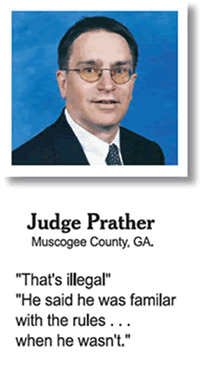 dates
in South Carolina, which is fundamental malpractice! He totally ruined
Clark’s chance for justice, while costing himself a big fee.
dates
in South Carolina, which is fundamental malpractice! He totally ruined
Clark’s chance for justice, while costing himself a big fee.
Clark was told by Chief of Cardiothoracic Surgery Dr. Lucke at the VA Medical Center in Asheville, NC in April of 2001, that he had silicosis – so the trigger date that starts the statute of limitations, which is simply a legal phrase meaning deadline, ended in Georgia in April of 2003. The statute of limitations in South Carolina was three years!
But Martin acted to cover himself in Georgia and Texas, which are two year states. He contacted at least two law firms, maybe more. He contacted Tom Hart with the famous Motley Rice firm in South Carolina. This was the firm that beat big tobacco and was featured in a movie and on 60 minutes. They advised him to file in South Carolina. He never disclosed to them that he had filed in Georgia already and that the case had been dismissed. They kept asking for medical records. Martin still didn’t even have all the records, so instead, he hired a firm in Fulton County,Georgia, obtaining the services of another attorney. But Martin never told this attorney about his encounter with Judge Prather in Muscogee.
Martin would write the pleadings, and give them to the new attorney to sign. For Martin, silence and hiding was the order of the day. The new attorney didn’t know about Prather or about Hart – and the client knew less than any of them, until he contacted the court and learned his case had been dismissed for eight months. Martin would later testify that he was unaware of the Hart firm, that he didn’t even remember them calling. An attorney from Hart’s firm would testify Martin had contacted them.
So now the Kirklands are in a Fulton County Georgia courtroom – even though they live in South Carolina, represented by a Texas attorney who hasn’t been granted permission to try a case in Georgia – and the top of the suit no longer says “Ingersoll-Rand,” but reads “3M,” the mask company who may have sold masks Clark used for two weeks while he was in the service.
3M moves the case from Fulton County, Georgia state court, to Georgia Federal Court. Mr. and Mrs. Kirkland have 30 days to move it back – but they don’t even know they have been moved to Federal Court. Martin misses that deadline and the suit is then moved to Federal Court in Corpus Christi Texas.
Obviously Clark is not happy. He lives in South Carolina; he’s been bounced like a yo-yo from Muscogee, Georgia to Atlanta, Georgia state court, to Atlanta, Georgia Federal Court, to Corpus Christi Federal Court. After two years his attorney has not talked to his doctor once, has missed three deadlines and now has him in a third state, Texas. The lead defendant is no longer Ingersoll-Rand whose equipment he used for three years but 3M – who Clark didn’t even want to sue.
Clark’s relationship with Martin - not good since his December, 2003, discovery of the betrayal - was now worse. He wrote Martin, “Don’t piss down my back and tell me it’s raining …you know you ruined my suit and my chance to get something for my family.”
In December 2003, Clark had tried to fire him and Martin e-mailed back, “I won’t allow that at this time…until I re-file your suit to protect you…” But now with the deadline passed in December 2004, in all three states, Clark wanted him to do what he said he could still do – beat the deadline. Clark told him it had to be done – honestly. Martin told him, “I quit.”
So, Clark took over. He wrote Ingersoll-Rand, he wrote 3M, he wrote the newest Judge, Federal Judge Janis Jack of the Corpus Cristi, Texas federal court, and Martin filed a motion to quit the case, because Clark contacted the other side!
Judge
Jack was conducting a national investigation into 10,000 people who
had collected for Asbestosis injuries – a disease 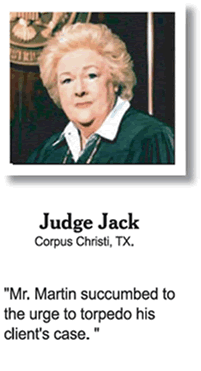 caused
by asbestos, whose attorneys now all claimed, with sworn doctors’
opinions, they had silicosis.
caused
by asbestos, whose attorneys now all claimed, with sworn doctors’
opinions, they had silicosis.
Judge Jack ordered Mr. Martin to appear in her courtroom and on February 16, 2005, Clark met his attorney of nearly 2 ½ years in person – because of Judge Jack’s order – for the very first time! At that meeting Mr. Martin appeared with his own attorney and he interrogated his own client Clark Kirkland. This was the first live, sworn testimony was ever taken by Martin the entire time and according to Judge Jack, Martin tried to “torpedo” Clark’s case by “proving” Clark knew he had silicosis in 1999 (two years before Dr. Lucke diagnosed it) and therefore his deadline to file had passed before he even met Clark. Martin claimed he didn’t “lose” Clark’s case and commit malpractice, because the deadline ended before he met Clark. Judge Jack shot Martin down, saying that if he wasn’t going to help his client he wouldn’t be allowed to question him. Then she sent the case back to Judge Batten in the Federal Court in Georgia.
In May of 2006 Judge Batten ruled that Clark Kirkland had to lose because a petition filed on the orders of Mike Martin were filed too late. The second Georgia suit for Clark Kirkland was tossed out.
The suit for his wife, Sharon Kirkland, for loss of consortium, essentially their sexual relationship, was not tossed out. The deadline for that suit was four years! So Ingersoll-Rand’s motion to dismiss beat Clark, but lost against Sharon.
The Kirkland’s weren’t happy. The consortium claim is the tail of the dog - no attorney would take it without the body – and worse, they hadn’t even understood Mr. Martin had filed for Mrs. Kirkland at all. Often wives won’t file for this small related action. Worse yet, the money-strapped Kirklands were caught in a foreign state, Georgia, with no attorney, no knowledge, and no desire to even have a consortium case. They settled quickly. The small amount is confidential by an agreement demanded by Ingersoll-Rand. Unknowingly, Mrs. Kirkland had also released another large suit. She gave up her fight to sue Ingersoll-Rand when Clark died.
Clark
then filed a grievance against Martin with the State Bar of Texas, because
Martin had not told him his suit was dismissed in April 2003, until
he was caught in December 2003. Martin 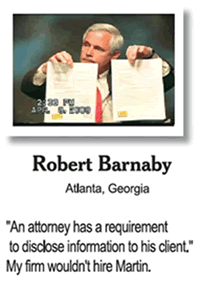 handed
the grievance committee a letter dated May 7, 2003 that said, “Dear
Clark, we filed your case last week, but it was dismissed by the Court
due to a clerical error on my part. Please call to discuss. We may want
to reconsider our venue. Sincerely, Mike Martin.” It wasn’t
typed by a secretary. It wasn’t mailed certified return receipt
requested. Clark never received it. Martin’s own paid expert witness,
a big time corporate attorney from Atlanta, Robert Barnaby, admitted
under oath it “might” have been backdated; but the Texas
Bar went with Martin and tossed Clark’s case against him for ethics
violations.
handed
the grievance committee a letter dated May 7, 2003 that said, “Dear
Clark, we filed your case last week, but it was dismissed by the Court
due to a clerical error on my part. Please call to discuss. We may want
to reconsider our venue. Sincerely, Mike Martin.” It wasn’t
typed by a secretary. It wasn’t mailed certified return receipt
requested. Clark never received it. Martin’s own paid expert witness,
a big time corporate attorney from Atlanta, Robert Barnaby, admitted
under oath it “might” have been backdated; but the Texas
Bar went with Martin and tossed Clark’s case against him for ethics
violations.
Next, Martin beat any criminal referral in Georgia by convincing Judge Prather to have mercy, because Martin was apparently “straight out of law school.”
Finding Malpractice Lawyer Michael Minns
Nothing was left but Clark’s efforts to get an attorney to sue Martin for Legal Malpractice. Who would handle a poor vet’s complaint against the powerful former State Representative?
In February of 2007, Mike Martin met the lawyer who agreed to represent Clark Kirkland – Michael Louis Minns. It was a bad day for Martin.
Minns was interviewed by Readers Digest who had gone to press a month earlier in January of 2007, with their issue, “The 40 Billion Scam.” In the article Minns stated, in his subtle but effective way, “If you haven’t checked with your client before you file your petition, it is negligence.”
Minns Deposes Attorney Michael Martin
Minns filed suit and during the eight hours of initial interrogation by Minns, the truth of his words in Readers Digest would be indelibly delivered to a squirming, trapped, two-faced political attorney, trying unsuccessfully to dance around Minns’ tough questions. It might have worked to beat a criminal charge. It might have been effective politics with the all too political State Bar of Texas, but with Minns, Martin’s low-blows were deflected. At the end of the day much of the truth was burned into video and typed by a court reporter.
This reporter has now watched the video of Minns deposing Martin. Key parts are available on the internet and anyone interested in the mastery of our beloved right to cross examination under our sixth amendment to the United States Constitution – and its use in the hands of a master, to corner a slick-talker into revealing the truth, should watch it. There would be nine continuances before the jury was finally sworn in, more than two years later, on July 15, 2009. On August 24, 2009 the judge signed an order against Martin for $150,000.00, plus costs and interest. Martin’s fate was sealed on that day. The evidence convinced the jury to find Martin had not complied with his fiduciary duties to Clark Kirkland and had caused him mental anguish of $150,000!
These cases are not for the uncommitted, and even with this powerful beginning there was two and half years of bitter battle combined with thousands of pages of harassing paperwork by Martin’s team. It would require a powerful team like Team Minns to succeed.
With Michael Minns as the lead attorney, Team Minns’ remarkable, Ivy League Educated lawyer Rain Minns (daughter of Michael Minns), would question Martin’s chief paralegal Arlene Black, a dangerous mission, as well as Clark Kirkland’s daughter Cathy Kirkland.
Lawyer Ashley Arnett, who took the bar exam last summer (08) and began working on the Kirkland case the next day, everyday, until the trial, handled pre-trial work and had to watch 3,200 pages of depositions, 10,000 pages of pleadings (the equivalent of 40 novels) and be ready to counter any numerous, devious efforts to take evidence out of context or slip in unproven “facts” as well as make bench arguments.
Finally, Team Minns was rounded out with one of Texas best lawyers, the incredible Will Adams, who is partner with his brother in the successful Adams Law Firm. Will would handle paper work with Rain and Ashley and all of the medical testimony.
You see, after claiming Clark knew he had silicosis in 1999, and after claiming he didn’t really know until February of 2002, Martin finally decided Clark never had silicosis at all. Team Minns needed a fearless attorney with the proper skills, to yank the truth out of two professional medical witnesses, who didn’t see patients, but just testified for attorneys. These two “attorney-loving” doctors were skilled witnesses at convincing jurors the real doctors don’t know what they are talking about. Will Adams had to examine these men to get the truth out and had to help the real doctor, who had no jury training, explain the truth. This tough assignment proved easy at the skilled hands of Will Adams. When the smoke cleared Dr. Lucke and Will were standing. Mr. Martin’s professional witnesses were not.
The duties of the case thus divided – Will handled the doctors, Michael Minns handled the attorneys and judges – and Rain and Ashley worked backup, with Rain handling two critical witnesses on the stand.
The test remained tough for Michael Minns to deal with Martin himself on the witness stand. It was attorney Robert Barnaby, Mr. Martin’s paid expert attorney, attorney Jim Ware, another paid expert and Martin’s team of attorneys, four strong, who would stop at nothing to rack up another win for Martin, against the Veteran Clark Kirkland, whose sacrifice to his country, would ultimately end his life May 29, 2009.
Unlike a federal criminal trial, a state civil trial often has much of the evidence taken on videotape – so you can actually see much of the real testimony the jury saw. Minns dissection of paid professional witness attorney Robert Barnaby is amazing even to a reporter like myself who has covered trials and assisted citizens winning trials for decades. Michael Minns got this hostile witness to admit his hiring boss, Mike Martin, may have back dated his letter to the bar, should have been more forthcoming, would have made him upset, and finally he wouldn’t hire Martin himself, although he had hired an accused felon. Minns got Barnaby to admit his own biggest case advertised on his website (although Barnaby claimed it wasn’t an “advertisement”) was actually a defeat. The jurors thought Martin’s expert hurt Martin. Once the jury saw Barnaby’s answers to Minns’ questions - Martin’s credibility was gone.
One of the most powerful witnesses ever to grace the witness stand, the Honorable Judge Morris Overstreet, former trial Judge, former prosecutor, former law school professor and former defender of the truth and the Constitution when he sat on the highest appellate court in Texas, the esteemed Court of Criminal Appeals, offered to speak for the Kirklands before this jury as an expert witness without charge. This was the first case he had ever agreed to speak on as an expert witness. The direct testimony with Minns questioning and this fantastic legal legend, Judge Overstreet, was riveting to the jury, which at the conclusion of the case named him as their favorite witness. All Judge Overstreet requested was the opportunity to use the evidence in this case for lessons in ethics to teach attorneys and law students how important ethical conduct is.
The last witness evidence was the moving and compelling testimony of Mrs. Kirkland, who shared the love story she had shared with Clark for 25 years. Rain Minns questioned Clark’s daughter Cathy on the stand and Michael Minns then questioned Clark Jr.
After a three week trial, the jury found that Mr. Kirkland’s case against Ingersoll-Rand shouldn’t have been filed, but that Martin’s conduct caused Mr. Kirkland $150,000.00 in mental anguish.
|
Subscribe to the NewsWithViews Daily News Alerts! |
As wonderful as the verdict and win was against such a formidable opponent, it was one of Minns' smallest legal malpractice awards and not enough to seriously help the Kirkland family. Minns agreed to represent Mrs. Kirkland and has filed another suit against Martin, this time for the Mrs. Kirkland instead of Mr. Kirkland and this time in South Carolina instead of Texas. Minns has filed suit in South Carolina Federal Court under the tort of “Outrageous Conduct” against Houston, Texas attorney Mike Martin. Round Two has just began!
Watch for our up-coming coverage of attorney Mike Martin’s accountability issues with famed Lawyer Michael Minns in the near future. Contact Attorney Michael Minns.
Partial Biography of Texas Lawyer Michael Minns
When
one thinks Michael Minns, one thinks about the famous  Tax
War Victories, this former boxing champion has fought such as, US. Vs.
Ginter, US. Vs. Doyle, US. Vs. Buford, Hongsermier vs. the Commissioner
of Internal Revenue Service, the disbarment of IRS attorneys Sims and
McWade, US vs. Moran, US vs. Oliver, US vs. Powell, US vs. Hansen, IRS
vs. Hobbs, Commissioner vs. Fred Ferber, US. Vs. Lashon and US vs. Williams,
endorsed by John Berthoud President of the national Taxpayers Union,
who had a series of debates with the former commissioner of the Internal
Revenue Service. We could go on but space does not permit.
Tax
War Victories, this former boxing champion has fought such as, US. Vs.
Ginter, US. Vs. Doyle, US. Vs. Buford, Hongsermier vs. the Commissioner
of Internal Revenue Service, the disbarment of IRS attorneys Sims and
McWade, US vs. Moran, US vs. Oliver, US vs. Powell, US vs. Hansen, IRS
vs. Hobbs, Commissioner vs. Fred Ferber, US. Vs. Lashon and US vs. Williams,
endorsed by John Berthoud President of the national Taxpayers Union,
who had a series of debates with the former commissioner of the Internal
Revenue Service. We could go on but space does not permit.
Minns’ Tax wars have taken him to be featured on G. Gordon Liddy’s show (where Liddy called him the best tax lawyer in America and endorsed his book "The Underground Lawyer"). Minns has been endorsed by Congressman Ron Paul, appeared on Good Morning America, Geraldo and he has been written up by The New York Times, Reader’s Digest and People Magazine.
� 2009 - Edward Snook - All Rights Reserved
Sign
Up For Free E-Mail Alerts
E-Mails are used strictly
for NWVs alerts, not for sale
Edward Snook is 20-plus year investigative journalist, with a college major in criminal justice and the publisher of US-Obsrver newspaper. 541-474-7885
E-Mail: ed@usobserver.com
Website: us-observer.com

